What is changing with Cornwall's household rubbish
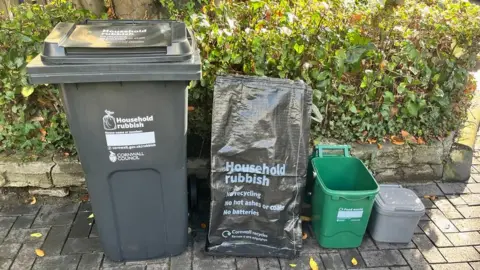 BBC
BBCThe way Cornish residents deal with household rubbish is changing.
In the coming months people living in mid-Cornwall, including Newquay and St Austell, will be the first to take on the council's new system.
By the end of 2025 every home will have new bins in the hope of reducing the amount of non-recyclable rubbish produced.
The council says the change will reduce Cornwall's annual carbon emissions by nearly 18,000 tonnes of CO2 each year.
Cornwall is late to make these changes. Of 32 councils in the South West, it will leave only the Isles of Scilly as having unlimited amounts of rubbish per household.
What new bins are there?
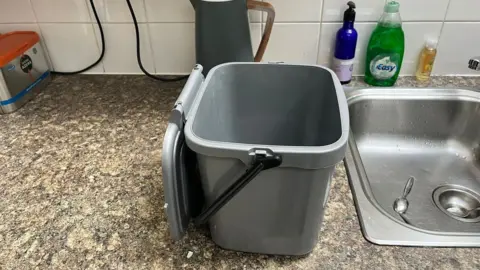
Designed to sit on your kitchen counter or under the sink, the indoor kitchen caddy will be delivered to every household.
A starter-pack of green biodegradable bin bags will be provided after which people will need to buy their own.
The bags are to be filled up with food waste such as vegetable peelings, apple cores, leftovers, teabags and any unwanted food.
The council said this bin should stay in the kitchen and does not need to be put out for collection.
The outdoor caddy
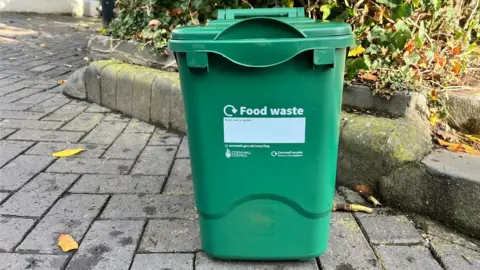
This one, which is called the outdoor caddy, sits outside the kitchen and takes the filled food waste bags from the silver caddy after they have been tied up.
Cornwall Council said it has a lockable handle on the top to deter vermin and to make it easier for waste operatives to empty.
Esther O'Bearagh, Waste and Recycling Community Engagement team leader, said: "The food waste will make a huge difference.
"A lot of people think they don't have food waste but every time you have an apple and have an apple core you have got food waste."
The wheelie bin
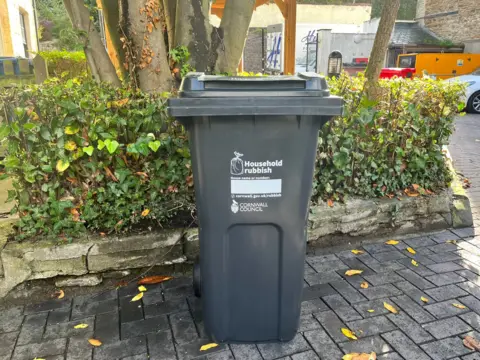
The black, hardened plastic wheelie bin will take about three to four black bin bags, filled with everything that cannot be recycled.
The council said the aim was to cut down on the amount of this type of rubbish, so anything that does not fit into the 180-litre bin will not be taken away.
The reusable protective sack is an alternative to the wheelie bin.
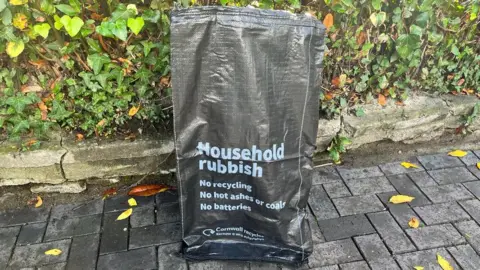
The council has assessed properties and will allocate the sacks or the wheelie bins accordingly.
People living in flats with lots of steps, or where they don't have enough outdoor space, will be getting a sack which has the same capacity as a wheelie bin.
What is happening to the old bins?
The orange, red and blue recycling bags should still be used, the council said, and will continue to be collected fortnightly for cardboard, plastic and paper respectively. The same is true of the black box for glass bottles.
Ms O'Bearagh said: "We need everybody to be reducing their rubbish. Most of the bins that are out there are bigger than these ones so we will be collecting those up and recycling them."
Alternatively the council suggests finding a new use for the old ones, like garden storage or converting them into water butts.
Are collections changing?
Ms O'Bearagh said: "It is a two-week rotation. Week one will be food waste and recycling, week two will be food waste and household rubbish."
When will the change happen?
The new bins are being introduced in six stages, one area at a time.
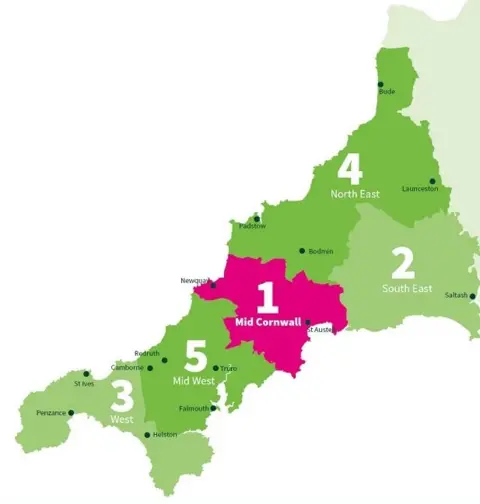 Cornwall Council
Cornwall CouncilThe first area is mid-Cornwall. This includes Newquay and St Austell and the first wheelie bins will be delivered from Monday.
The council's delivery contractor will have crews out delivering bins over a two to three-month period in each area.
The second area is south-east Cornwall, including Looe and Saltash, followed by west Cornwall, including Helston, St Ives and Penzance.
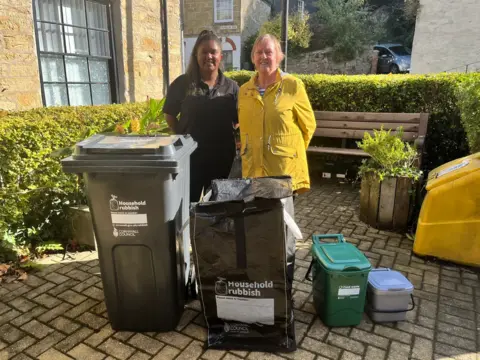
Next on the list is north-east Cornwall, including Padstow, Wadebridge, Launceston and Bude.
The council plans to have the whole of Cornwall operational by the end of 2025 with the final area being the mid-west, including Truro, Falmouth, Camborne and Redruth.
And just because your new bins have been delivered does not mean it is time to start using them. The council will be in contact with a collection calendar before the new service starts.
There are a number of rubbish and recycling roadshows happening too, starting off in mid-Cornwall and moving around as the roll-out progresses.

Follow BBC News South West on Twitter, Facebook and Instagram. Send your story ideas to [email protected].
